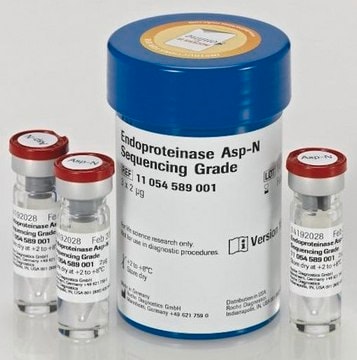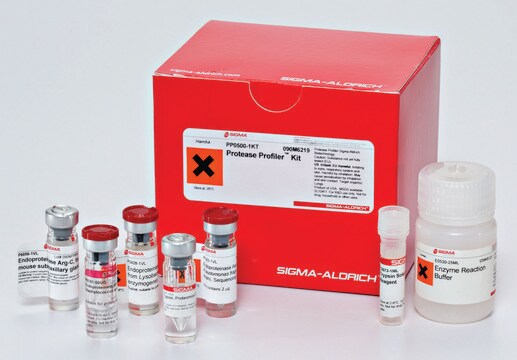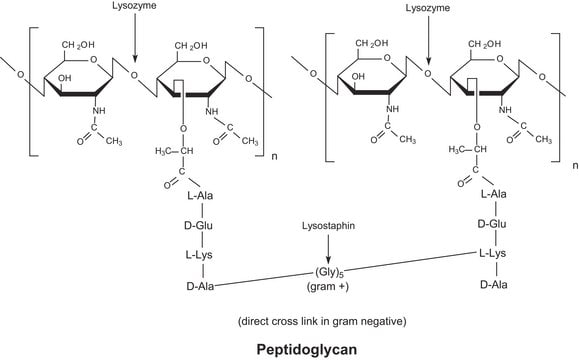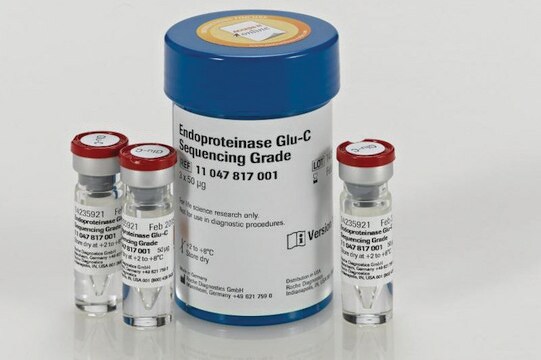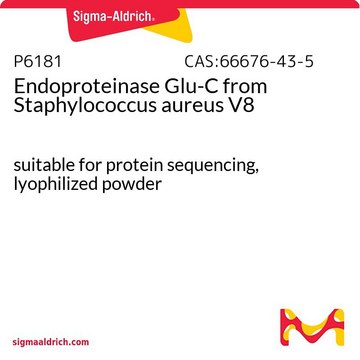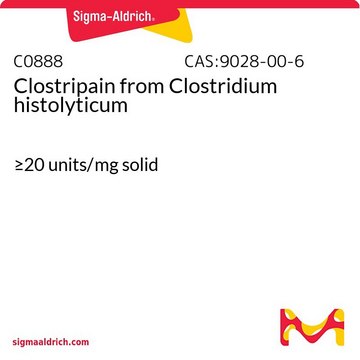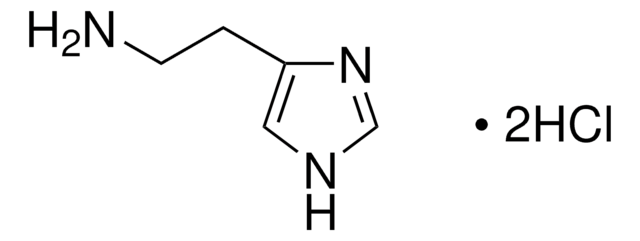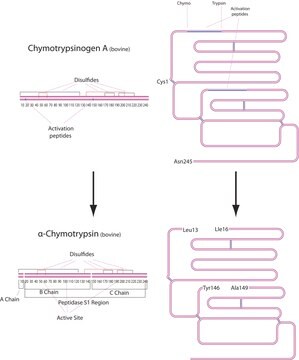P6056
Endoproteinase Arg-C from mouse submaxillary gland
suitable for protein sequencing, lyophilized powder
Se connecterpour consulter vos tarifs contractuels et ceux de votre entreprise/organisme
About This Item
Numéro CAS:
Numéro CE :
Numéro MDL:
Code UNSPSC :
12352202
Nomenclature NACRES :
NA.56
Produits recommandés
Forme
lyophilized powder
Conditionnement
vial of 5 μg
Adéquation
suitable for protein sequencing
Température de stockage
−20°C
Vous recherchez des produits similaires ? Visite Guide de comparaison des produits
Application
Endoproteinase Arg-C from mouse submaxillary gland has been used to study the syncytium formation in MERS-CoV (middle East respiratory syndrome coronavirus)-infected Vero cells in the presence of exogenous proteases. It has been used for the digestion of Rpl23ab (ribosomal protein L23ab)-containing fraction for LC-MS (liquid chromatography–mass spectrometry)/MS analysis.
Actions biochimiques/physiologiques
Endoproteinase Arg-C is a serine endoprotease from mouse submaxillary gland which hydrolyzes peptide bonds at the carboxyl side of arginyl residues. The enzyme has been shown to cleave Lys-Lys and Lys-Arg bonds, and all Arg-X bonds may not be hydrolyzed.
Définition de l'unité
One unit will hydrolyze 1.0 μmole of Nα-p-tosyl-L-arginine methyl ester per min at pH 8.0 at 25 °C.
Inhibiteur
Mention d'avertissement
Danger
Mentions de danger
Conseils de prudence
Classification des risques
Eye Irrit. 2 - Resp. Sens. 1 - Skin Irrit. 2 - STOT SE 3
Organes cibles
Respiratory system
Code de la classe de stockage
11 - Combustible Solids
Classe de danger pour l'eau (WGK)
WGK 3
Faites votre choix parmi les versions les plus récentes :
Déjà en possession de ce produit ?
Retrouvez la documentation relative aux produits que vous avez récemment achetés dans la Bibliothèque de documents.
Les clients ont également consulté
Middle East respiratory syndrome coronavirus infection mediated by the transmembrane serine protease TMPRSS2.
Shirato K, et al.
Journal of Virology, 87, 12552-12552 (2013)
Tanya R Porras-Yakushi et al.
The Journal of biological chemistry, 282(17), 12368-12376 (2007-03-01)
Ribosomal protein L23ab is specifically dimethylated at two distinct sites by the SET domain-containing enzyme Rkm1 in the yeast Saccharomyces cerevisiae. Using liquid column chromatography with electrospray-ionization mass spectrometry, we determined that Rpl23ab purified from the Deltarkm1 deletion strain demonstrated
Naoto Hoshi et al.
Molecular cell, 37(4), 541-550 (2010-03-02)
A-kinase anchoring proteins (AKAPs) coordinate cell signaling events. AKAP79 brings together different combinations of enzyme binding partners to customize the regulation of effector proteins. In neurons, muscarinic agonists mobilize an AKAP79-anchored pool of PKC that phosphorylates the KCNQ2 subunit of
Tanya R Porras-Yakushi et al.
The Journal of biological chemistry, 281(47), 35835-35845 (2006-09-29)
The ribosomal protein L12ab (Rpl12ab) in Saccharomyces cerevisiae is modified by methylation at both arginine and lysine residues. Although the enzyme responsible for the modification reaction at arginine 66 has been identified (Rmt2), the enzyme(s) responsible for the lysine modification(s)
Proteomics in Functional Genomics: Protein Structure Analysis (2000)
Notre équipe de scientifiques dispose d'une expérience dans tous les secteurs de la recherche, notamment en sciences de la vie, science des matériaux, synthèse chimique, chromatographie, analyse et dans de nombreux autres domaines..
Contacter notre Service technique

